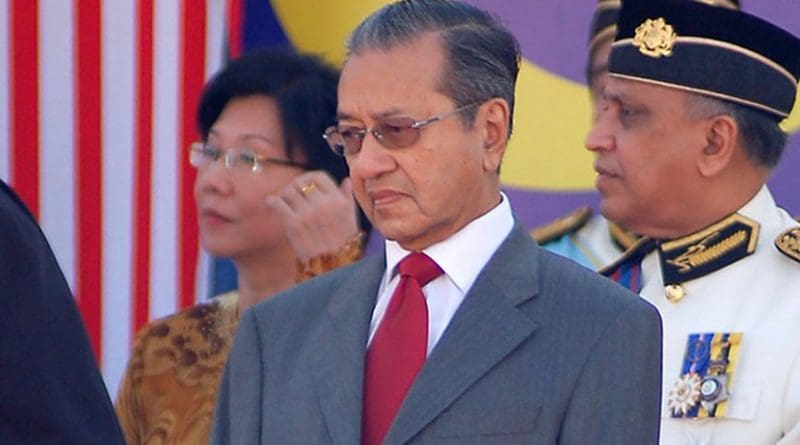Will Mahathir Reset China-Malaysia Trade Relations? – Analysis
A shock electoral upset has just returned 92-year-old Dr Mahathir Mohamad to the prime ministerial chair in Malaysia. The run-up to this climax was muddled by a miasma of fake news, lurid allegations and outright conspiracy theories from eitherside of the political divide. China-baiting was inevitably drawn into this tawdry mix despite mainland investments being a stabilizing main stay of the local economy.
According to an Economic Intelligence Unit report last year, Malaysia was the fourth-largest recipient of mainland Chinese direct investments – right behind Singapore, United States and the autonomous Chinese province of Hong Kong. Although the sum total of Chinese investments in Malaysia has not been adequately tallied,the US$100 billion Forest City project provides a snapshot of the staggering amounts being invested into the local economy.
While former Prime Minister Najib Razak hailed these investments as an imprimatur ofhis government’s investor-friendly policies, the opposition camp (and new government) accused him of “selling out to China”. In reality, one doubts whether foreign consortiums canmatch the scale, cost-effectiveness and speed of execution of many Chinese-led projects in Malaysia.
Business Compradors
Dr Mahathir has particularly taken issue with the inadequate number of local jobs created by Chinese investments in Malaysia. It is an argument not without merit.Overseas Chinese infrastructure projects are known for their heavy reliance on mainland labour, machines and supplies – of the lock, stock and barrel variety – tokeep costs, graft and middlemen interference to the lowest possible scale.
Curiously, the backbone of Dr Mahathir’s electoral tsunami came from the ethnic Malaysian Chinese community who openly hailedthe global ascent of China. That was until theydiscovered thatmainland business models accommodated as few middlemen as possible.It was Alibaba on a massive scale, missing 40 thieves and in perennial need of 40innovators.
Many Malaysian consumerssave thousands of ringgit each year by purchasing a variety of consumer products directly from China instead of forking out a hefty mark-upat local stores.Unsurprisingly, there are now growing calls to tax online purchases from China. This is not going to help budget-strapped Malaysians who voted in the new administration on the back of complaints over rising living costs. Malaysia’s shadow economy has been estimated by various studies to range between 30 percent and 47 percent of its GDPup till 2010.
The anti-China narrative therefore may be couched in terms of multifaceted grievances like jobs and the South China Sea but it primarily boils downtoincentives for middlemen who contribute little or nothing in terms of value-additions to projects, productsor services offered by mainland companies. These modern-day compradors have an ally in another area bereft of value – added or otherwise.
Media Compradors
The biggest impediment to the Malaysian economy is not China, its business modus operandi or the lack of local talent. It is the Malaysian media which has abjectly failed to relay grassroots ideas and innovations to national policy-makers for decades.
The author himself vividly remembers the lament of Dr Mahathir’s former national science advisor on the dearth of science journalists in Malaysia. This translates to recurring losses in taxpayer money.There is an oft-told account of how a fact-findingdelegation to the United States, seeking particular expertise in renewable energy technology,were told that the expert they were looking for was a Malaysian academic back in Kuala Lumpur!
Researchers needing critical economic or scientific data on Malaysia are likely to get them from foreign sources as even google cannot cope with the bottomless insipidity and juvenile meanderingsof the local media. Publicity-seeking experts with dodgy backgrounds are routinely sought for their banal insights and quotes in return for guaranteed filler spaces in a lack lustre media.Malaysia is gradually losing its economic and intellectual competitiveness due to the entrenched practise of mediocrity promoting mediocrity – egged on by Western interests.This forms the main backdrop to the current anti-China narrative.
Local media stalwarts privately blame politicians, in particular Dr Mahathir himself (during his previous 22-year reign) for the lack of media vigour and freedom in Malaysia. While media restrictions undeniably exist, one wonders how proposed articles on topics such as Open Governance could be seen assubversive.
It is high time to drain the swamp in Malaysia. Dr Mahathir has already indicated that the bloated 1.6 million-strong civil service in Malaysia would be pruned to promote economic and government transparency. For decades, successive governments had rewarded personal loyalty with plush posts and contracts. Malaysians now have another chance to demand efficient, meritocratic and transparent governance. Not mass-mediated bogeymen, viral passions and pies-in-the-skies.
The billion-dollar question now is whether the new administration will be able tousher in a transparent and vibrant media – one that can explore greater synergies within and abroad.Otherwise, Malaysia’s relations with its neighbours and trading partners are bound to deteriorate, along with its economy.
An abridged version of this article was published by CCTV’s Panview on May 14, 2018

